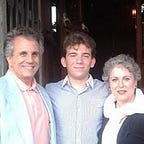Intrinsic Reward, Biological Utility, and Saving the Planet
I have long believed that the best things to do are the things that drive you internally, rather than those things that solely bring extrinsic rewards (e.g. payment, etc.). So when I recently came across the below lecture, “Behavior without Utility” (by Prof. Simon DeDeo from Carnegie Mellon and the Santa Fe Institute), I was intrigued.
DeDeo proposes a way to explain human behavior that doesn’t depend on representing one’s desires with a “utility function” — i.e. a formula for determining how much a person likes / dislikes a particular state of the world, thereby capturing the person’s preferences.
One might ask, “what’s wrong with describing a utility function?” The issue DeDeo points out is that utility functions are arbitrary. How does the agent decide what it wants? Where do these desires come from? By watching a person behave, one can of course back-calculate some utility function that explains the observed behavior. But in some sense, this doesn’t tell us mechanistically what’s driving the person’s behavior.
As he describes in the opening segment, “One of the things I have come to believe is that rational choice theory, and in particular its basis in utility theory, is fundamentally unscientific. … it is not a way to explain why the world is the way it is.”
Instead, DeDeo proposes there is something more fundamental than the utility function — indeed, what determines the utility function. And that this is what guides an intelligent organism’s actions that is relatively universal across individuals, and even across cultures.
Rational choice theory, and in particular its basis in utility theory, is fundamentally unscientific.
He presents a substitute for the utility function, where the agent tries to maximize what it learns about its environment. He shows a similarity to Friston’s free-energy principle, which uses a similar entropic quantity to describe the behavior of any living organism.
Towards Biological Utility
My overall takeaway is that we need to replace the concept of utility with something grounded in biology. It seems like a more satisfying and realistic model than utility theory, which allows specifying arbitrary utility functions.
Perhaps this also offers insight into fixing what’s wrong with our economy. For example, our economy doesn’t seem to understand climate change yet — it’s not priced into the utility function of “economic growth” that our economy is supposed to optimize for.
An economy that ignores climate may very well maximize this imaginary notion of “utility.” But such an economy will ultimately destroy the biological building blocks upon which it rests, and get selected out by evolution. Only with a biologically-grounded utility function will these two processes align (rational choice and evolution).
So, a biological/physical model for intelligent behavior, rather than an abstract utility-based one, seems like the type of thing that’s fundamental both for conceiving more flexible AI agents, as well as for saving the planet.
